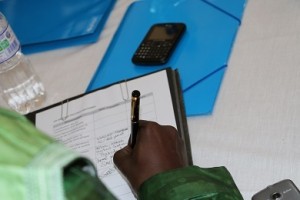中非共和國武裝組織同意釋放數千名兒童
2015-05-05
(只提供英文版本)
 © UNICEF
In Bangui, the leader of an armed group signs agreement to release children. |
BANGUI, Central African Republic/ HONG KONG, 5 May 2015 - Leaders of armed groups in the Central African Republic agreed today to release all children associated with their forces and to immediately end any new child recruitment.
An estimated 6,000 to 10,000 children are currently associated with the country’s armed factions according to UNICEF. The figure includes those serving as combatants and used for sexual purposes, as well as those working as cooks, messengers and in other roles.
“This is a major step forward in the protection of children in this country,” said Mohamed Malick Fall, UNICEF’s Representative. “The Central African Republic is one of the worst places in the world to be a child, and UNICEF is eager to work with local authorities to help reunite these children with their families.” |
The agreement, which was facilitated by UNICEF and its partners, was signed during a week-long national reconciliation forum in the capital Bangui, from 4 to 11 May, aiming to restore peace to the strife-torn country. The forum ings together members of the government and parliament, political parties, civil society organisations, religious and community leaders as well as the leaders of the armed groups.
Following the signing of the declaration, the parties will agree on a schedule for the release of the children, for their reunification with their families and communities, and for the provision of protection and support to help them to rebuild their lives.
The leaders of the armed groups have also agreed to give UNICEF and its partners immediate and unrestricted access to the areas under their control in order to identify and verify the number of affected children and plan the release process.
More than two years of violence in the Central African Republic has created one of the world’s worst – and least visible - humanitarian crises. The release of the children by the country’s armed groups will place additional demands on the already limited funding available to respond to the emergency.
In 2014, UNICEF and partners secured the release of over 2,800 children in the Central African Republic, including 646 girls, from armed groups. That was almost a six-fold increase from the 500 children released by armed groups in the country in 2013.









